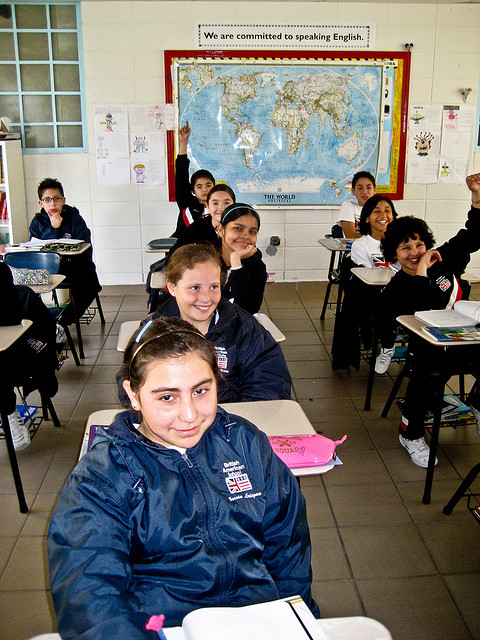 Here is a made-up story that is nevertheless true.
Here is a made-up story that is nevertheless true.
Carmen and James have two children, ages one and two. James is not Catholic, but both he and Carmen have agreed that for the sake of family unity, they should both practice the same faith. So James has started the RCIA process at his parish. The problem, however, is that the family is often absent from Sunday Mass. And James is frequently late to the catechetical sessions or misses them altogether. So far, he has missed the sessions on Revelation, Mary—Ever Virgin, Magisterium, and Purgatory. It is difficult to see when he can make these up, especially if his attendance continues to be erratic.
Would you stop doing RCIA?
What would you do if you were the RCIA catechist in James and Carmen’s parish? You know what I’d do? I’d stop doing RCIA. At least with James, anyway. James doesn’t need RCIA. He needs “How to Hold It Together Without Losing My Mind.” Or he needs “Where Is God When I’m Fighting with My Wife All the Time?” Or he needs “When Am I Going to Get a Decent Job that Pays the Bills?”
Something happens to us (and by “us” I mean “me”) when we become catechists. We think we are personally responsible for delivering the entire 2,000-year history, doctrine, law, and liturgy of the church in a few short months into the heads (and perhaps the hearts) of folks who just want “to be Catholic.” I remember my first “job” as a catechist. I was 17, and the parish DRE asked me to substitute for the sixth-grade catechist for one session. Maybe I wasn’t 17 and maybe it wasn’t sixth-graders. I don’t remember. What I remember is that it was my job was to teach the Lord’s Prayer to the children. So I went to the library at the Catholic high school in town, and I looked up everything I could on the Lord’s Prayer. I wrote out a lesson plan that probably rivaled Eisenhower’s D-Day landing strategy. I had history, theology, ecclesiology, christology, and every other “ology” I could think of crammed into a 30-minute class. I think I was still on “who art in heaven” when, mercifully for the children, the clock ran out.
And you want to know the really crazy part? (Yeah, it gets crazier.) When I was in sixth grade, I prayed the Lord’s Prayer a lot! I prayed a lot of prayers because my mom was pregnant with my baby sister. I was old enough to know that childbirth can be risky. I was old enough to know that not all babies are born healthy. I prayed and prayed and prayed. But I never said a word about that to the kids I was supposed to be teaching. I never even thought about it. I was just worried about being a good catechist. I wonder how many of those sixth-graders needed to learn how to pray that day.
A time to listen
Fortunately, Evelyn is a better catechist than I was. Evelyn is the RCIA catechist in my made-up-but-true story about Carmen and James. Evelyn had raised three children on her own, and she knew the struggles young parents go through. She set up a time to talk with James. Or rather, she set up a time to listen to James. By listening, she found out James’ hours had been cut back at his job. He had taken on a second job to bring in some more money. He had to work a lot of evenings and sometimes on Sunday. On the Sundays he worked, Carmen didn’t like bringing the babies to church by herself. They cried and fussed a lot, and she didn’t feel capable of managing them in public by herself.
Evelyn went home from that meeting and prayed, “Lord, if you were me, what would you say to James?” And from what came to her in prayer, this is what Evelyn did.
Granny-care
Evelyn contacted some of the grandmothers in the parish to sit with Carmen (and James, when he was there) at Mass on Sundays to help tend to the babies.
Revelation
She set up a meeting at a time James wasn’t doing a double-shift with some of the other underemployed and unemployed people in the neighborhood to pray together and discuss job-hunting strategies. Other than the prayer, Evelyn only said one “catechist-y” thing during the meeting. She asked if anyone in the group saw God’s hand in their struggle to find meaningful work (which, after all, is what Revelation is all about).
Mary
She set up another meeting with new parents to talk about what it’s like be responsible for a new life and for raising that new person to be healthy and successful in a world fraught with danger. She managed to slip in there at one point that Mary—the Mother of God—must have had similar fears.
Magisterium
Evelyn even got a few of the wealthier parishioners to donate the registration fee and child care costs so Carmen and James could attend a diocesan retreat on building strong, holy families. She was able to explain to James that the bishop asked for this retreat in preparation for Pope Francis’ call for a world-wide meeting of bishops to discuss how important families are in the church. (She never used the word “Magisterium,” but James learned about it nonetheless.)
Purgatory
And one other thing Evelyn did was to make sure James and Carmen were able to be at the All Souls Day Mass in the parish. After Mass, she had coffee with them and with a few other “RCIA” candidates. She asked them if they had prayed for anyone in particular during the Mass, a loved one who had died. She wondered aloud why we would pray for the dead, and then she stepped back and let the group discover the teaching of Purgatory on their own.
What I had done in my first job as a catechist is confuse catechesis with “class.” The catechesis was, after all, divided up by “grades.” And it took place in a school classroom. And nobody told me it wasn’t supposed to be a class. So it was an easy mistake to make. But it was a mistake. Those kids didn’t need to learn about the Lord’s Prayer. They needed to learn how prayer could save them from fear.
Evelyn knew James didn’t need to learn about what it meant to be Catholic. He needed to learn how faith in Jesus Christ would save his life and the life of his family. She knew he couldn’t learn that in a classroom. So she stopped doing “RCIA” and started doing “Here’s Why Everything We Do As Catholics Matters to You.” The question we have to ask (and by “we” I mean “I”) is, how are we going to make Jesus and the church matter to the James in our lives?
Your thoughts?
Do you have a James in your life? If Jesus were going to say something through you to your James, what would that be?


















Nice. Realistic.
What a great story! Thank you! Much food for thought.
Great article. Being a catechist in RCIA, I have experienced this many many times. I had one teen who was pretty much an atheist. I was asked many times how things were. Fine I said. They really were not, but just as Christ has patience with us, we too are called to have love and patience. It is not me who does conversion. I plant the seed. The Spirit does the rest. I have had kids with ADHD, Autism, and other issues that others say are not ready. All we do is push them away. That is unacceptable. We must remember, we are to continue Christ’s mission here on earth, and this path to sainthood is messy till the very end.
I would never turn anyone away, nor pretend I can read their minds or know their hearts, as long as they keep showing up, on time or late, there is some movement going on. They may have to wait till the next Easter Vigil, and many of them do. As an aerospace engineer, Adult RCIA Catechist and Past Grand Knight in The Knights of Columbus I know how hectic life can get, and it does not mean I am not putting Christ 1st. Like our New Pope, we must be Pastoral, I always recommend Catechists take a Pastoral Class along with their Catechists Classes. I like Ralph’s response. I have had classes vote with-out me present saying they thought a certain person was not ready for RCIA or to be Catechized as he also missed several classes. I reminded them of the story of the protocol son, many were still disturbed and even snubbed him because they had to attend every class and he didn’t, what business is it of theirs? The young man in question just completed his 2nd year as a seminarian, most of the others from that class I never see at mass. I would say 75% of the Catachisis takes place after Pentecost, when the class is through. As so it should, and did with the apostles.
All is Grace,
Mike Murphy
I am so grateful for this article from you Nick. It is a reminder of what we really are about in the RCIA ministry. I will be sure to send this on to parish diretors, coordinators, team members, and others who are in a class our diocese offers for Christian Initiation team formation. I have always included the philosophy that we should “be meeting the needs” of our people but what you have given us as an pastoral example is much more specific, and eye-opening.
The Holy Spirit strikes again!
I’m looking at putting together criteria of readiness for the Rite of Acceptance and Rite of Election, based on RCIA #42 and #120. Initiation is messy business, but I think having clear expectations for those on the journey (which they could do some self-evaluation with) and those accompanying them would be helpful. Anyone have something like this criteria that they use?
This article reminds me of the need to pay attention to the person, not just stubbornly hold up a measuring stick.